Participating in short-term mission trips allows you to serve communities in need while growing spiritually and personally. You’ll take part in activities like medical care, education, and community projects, all while building lasting relationships. These trips challenge you to embrace cultural differences, develop new skills, and face challenges with resilience. If you want to learn how to prepare and make a meaningful impact, keep exploring the key aspects you’ll encounter on your journey.
Key Takeaways
- Short-term mission trips serve communities in need while promoting personal faith, growth, and cross-cultural understanding.
- Participants engage in activities like medical outreach, education, and construction to create lasting community impact.
- Preparation involves cultural sensitivity, proper packing, safety awareness, and collaboration with local leaders.
- Building relationships through intercultural communication fosters trust, mutual respect, and meaningful partnerships.
- These trips challenge participants, develop leadership skills, and deepen spiritual growth through service and reflection.
Understanding the Purpose of Short-Term Missions
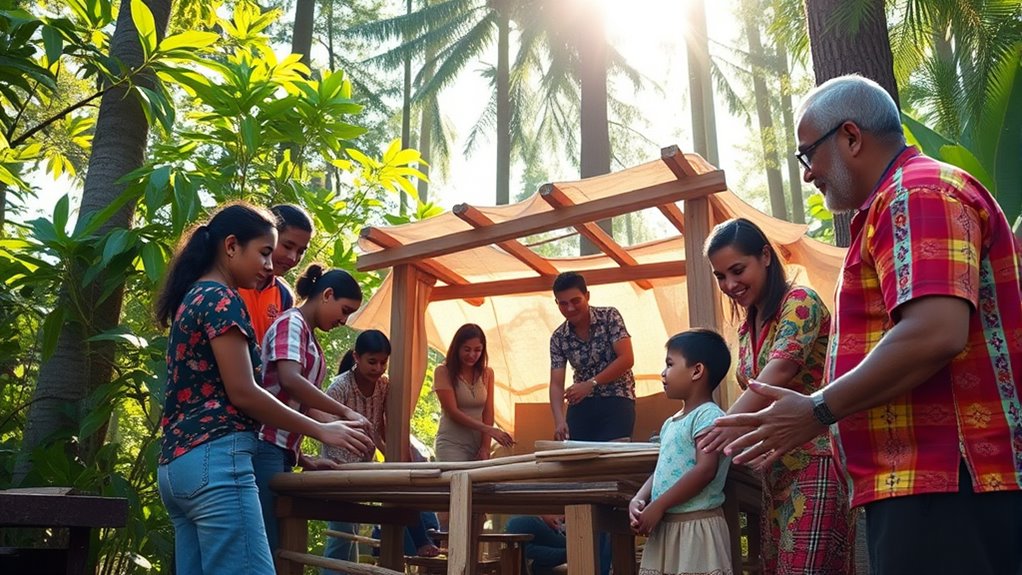
Short-term mission trips are often misunderstood, but their primary purpose is to serve communities in need while also fostering personal growth and faith. As you participate, you’ll experience spiritual growth by stepping outside your comfort zone and engaging with new cultures. These trips often present faith challenges, pushing you to rely on trust and prayer in unfamiliar situations. Facing these challenges helps deepen your relationship with God and clarifies your spiritual purpose. You may find your faith strengthened as you witness others’ resilience and faith in difficult circumstances. Additionally, understanding cybersecurity vulnerabilities during such trips can help protect your personal information and maintain safety. Being aware of potential security risks ensures that your experience remains safe and focused on service. Preparing for potential digital threats can prevent disruptions and preserve the integrity of your communications. Recognizing vulnerabilities in communication can further safeguard your interactions and ensure your mission’s success. Ultimately, short-term missions aren’t just about helping others—they’re about transforming your own spiritual journey, encouraging you to grow closer to God and develop a more profound understanding of your faith.
Common Activities and Projects During Trips

During your mission trip, you’ll participate in a variety of activities and projects designed to meet the specific needs of the community. Medical outreach is common, where you may assist healthcare professionals in providing basic medical care, vaccinations, or health education. These efforts help address urgent health concerns and build trust with locals. Educational workshops are another key activity, focusing on topics like hygiene, nutrition, or literacy. You might lead or support sessions that empower community members with knowledge to improve their lives long-term. Construction projects, food distribution, and children’s programs are also often part of the trip, giving you opportunities to serve practically while fostering relationships. Engaging with local resources can enhance the effectiveness of your efforts and ensure sustainable impact. Incorporating principles of thermal energy transfer into the community’s infrastructure, such as installing efficient heating systems, can provide long-term benefits. Understanding materials needed for candle making and how to safely work with them can inspire creative ways to fundraise or support community projects. Learning about butter’s historical significance can also serve as an engaging educational activity that connects cultural heritage to community development. Additionally, sharing knowledge about beneficial nutrients and antioxidants in honey can be incorporated into health and nutrition education sessions. These activities allow you to make a tangible difference and experience the community’s resilience firsthand.
Preparing for a Successful Mission Experience
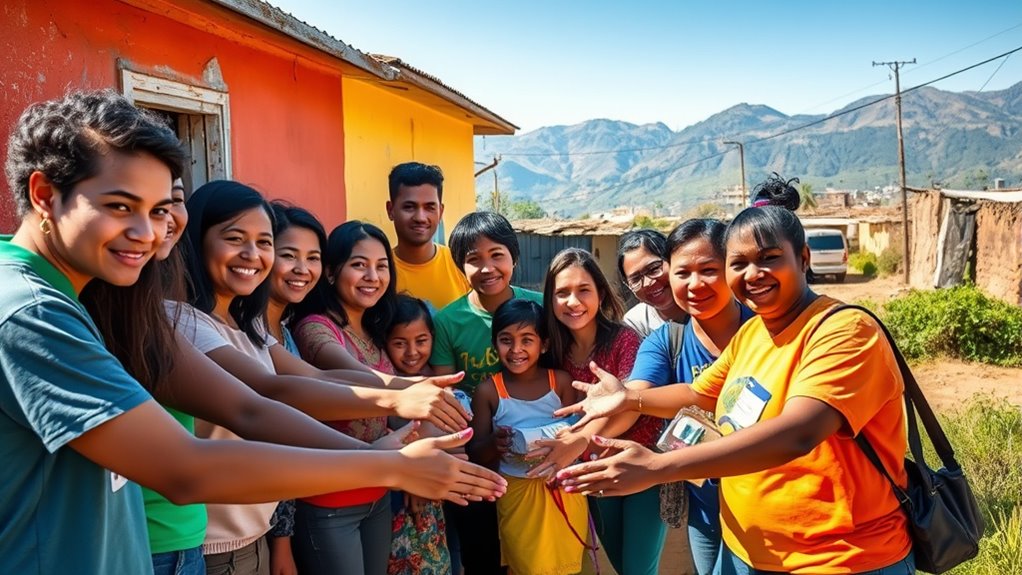
Before you go, take time to research the needs of your destination so you can prepare effectively. Pack wisely by including essentials and respecting local customs, avoiding overpacking. Additionally, cultivating cultural sensitivity helps you connect better and show respect to the community you’ll serve. Considering local traditions can also inspire you to bring meaningful gifts or decorations that celebrate local artistry and environment. Engaging with local environmental practices can further enhance your understanding of sustainable living and respect for nature during your trip. Understanding precious metals investment strategies can also help you plan your financial future responsibly.
Research Destination Needs
Researching the needs of your destination is a crucial step in ensuring your mission trip is effective and respectful. By understanding the local community’s specific challenges, you can tailor your efforts to meet real needs rather than assumptions. Conducting a resource assessment helps you identify existing infrastructure, programs, and gaps in services. This preparation allows you to coordinate with local organizations and avoid duplication. Engaging with community leaders or partners beforehand provides insight into culturally appropriate solutions. Your goal is to support sustainable change, not impose outside ideas. Incorporating asset division strategies and local resources and training into your planning can further enhance the effectiveness and sustainability of your efforts. Additionally, understanding the community’s existing food sources and nutritional practices can help ensure your initiatives align with local customs and needs. Recognizing the importance of community involvement can foster greater acceptance and long-term impact of your projects. Being aware of local economic conditions can also help you develop realistic and impactful initiatives.
Pack Appropriately and Wisely
Packing thoughtfully is essential to guarantee your mission trip runs smoothly and efficiently. Start by choosing appropriate clothing that suits the climate and activities you’ll participate in. Prioritize comfortable, modest, and versatile outfits that can be layered. Don’t forget packing essentials like toiletries, chargers, and any necessary medications. Keep your bag organized with packing cubes or compartments to easily access what you need. Remember to bring a reusable water bottle, a hat, and sunglasses for sun protection. Avoid overpacking by sticking to a manageable number of items—less is more. Well-planned packing ensures you’re prepared for daily tasks and cultural norms, allowing you to focus on your mission rather than scrambling for forgotten essentials. Additionally, understanding payment processing methods can be helpful when managing donations or purchases during your trip. Being aware of clothing guidelines tailored to the local customs can also help you show respect and blend in more effectively. Also, familiarizing yourself with nutritional considerations can be beneficial if you’ll be involved in community feeding programs or need to adapt to local dietary options. For example, considering the home environment and potential dust or allergens can help you pack appropriate supplies or medications. To further enhance your readiness, researching local climate patterns can help you pack appropriately for varying weather conditions.
Cultivate Cultural Sensitivity
Cultivating cultural sensitivity is key to building respectful relationships and making a positive impact during your mission trip. By practicing intercultural communication, you show respect for local customs and traditions, which fosters trust and openness. Embrace cultural humility by recognizing that you don’t have all the answers and being willing to learn from those you serve. Ask questions, listen actively, and avoid making assumptions. Remember, understanding cultural differences helps prevent misunderstandings and demonstrates genuine respect. Your openness to new perspectives not only enriches your experience but also strengthens connections with community members. Being aware of local customs and traditions and their significance can greatly enhance your interactions and effectiveness. Developing cultural competence can further deepen your understanding and improve your ability to navigate diverse environments. Approaching your trip with humility and a desire to learn creates a more meaningful, impactful mission while honoring the people and culture you’re engaging with.
Building Relationships With Local Communities
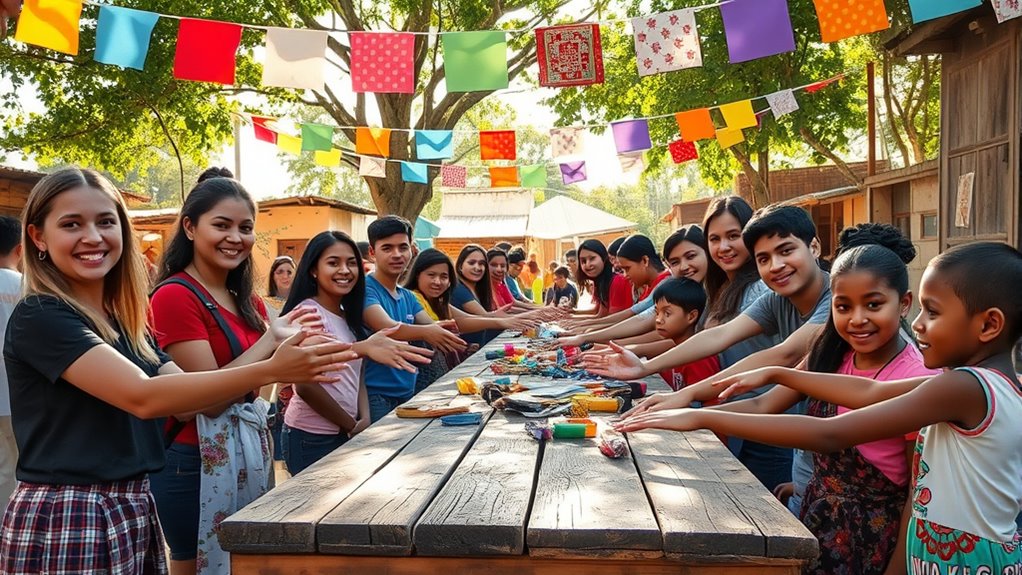
Building relationships with local communities is essential for the success and sustainability of short-term mission trips. When you engage with the community, you’re fostering genuine connections that go beyond surface-level interactions. Focus on active community engagement by listening to their needs, involving locals in planning, and respecting their perspectives. This approach helps build mutual understanding, which is vital for creating meaningful change. Your efforts should center on collaboration rather than imposing solutions. By demonstrating respect and a willingness to learn, you build trust that can last beyond your visit. Remember, building relationships isn’t just about what you can give; it’s about forming partnerships rooted in understanding, shared goals, and mutual respect that benefit both your team and the community long-term.
Cultural Sensitivity and Respect
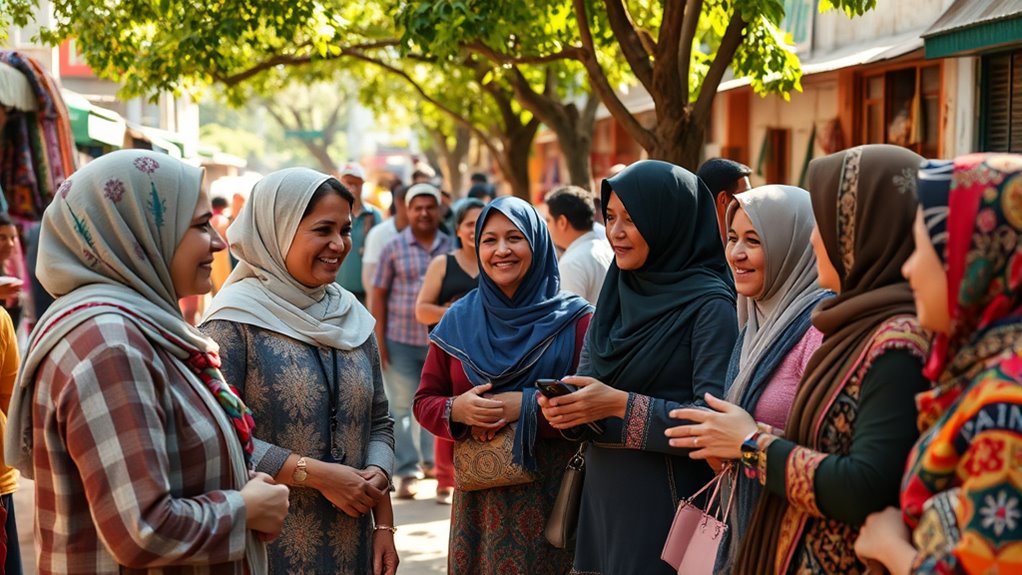
When you visit a new community, it’s important to embrace local customs and show respect in your communication. Avoid making assumptions about their culture, and be open to learning from their traditions. By doing so, you demonstrate genuine respect and build trust with those you serve.
Embrace Local Customs
To truly respect the communities you visit, it’s essential to embrace their local customs and cultural norms. By doing so, you demonstrate genuine respect and foster meaningful connections. Cultural adaptation involves observing how locals behave, dress, and interact, then adjusting your actions accordingly. For example, learning appropriate greeting gestures or dress codes shows sensitivity to their traditions. Avoid imposing your own cultural standards, and instead, approach new customs with humility and openness. Remember, embracing local customs isn’t just about politeness—it’s about building trust and showing respect for the community’s identity. Small gestures of cultural adaptation can make a significant difference, helping your mission trip be more effective and impactful for everyone involved.
Communicate With Respect
How can you guarantee your words show genuine respect during a mission trip? Start by practicing good media etiquette—think before you post or share anything, respecting others’ privacy and dignity. Be mindful of language barriers; avoid slang or idioms that might be misunderstood. Use simple, clear language to communicate effectively, and consider learning basic phrases in the local language to show effort and respect. Remember, tone and body language also matter—smile, listen patiently, and avoid making assumptions. Your words and actions should always reflect humility and sensitivity. Showing respect in how you communicate helps build trust and fosters genuine connections. By being intentional about your language and media interactions, you demonstrate respect for the community and its culture.
Avoid Cultural Assumptions
Have you ever considered that making assumptions about a culture can unintentionally cause offense or misunderstandings? Relying on cultural stereotypes or ethnocentric attitudes risks oversimplifying complex traditions and beliefs. Instead, approach each community with humility and an open mind. Avoid assuming you know what’s best or how people should live; respect their customs and perspectives. Remember, what may seem unusual to you might be deeply meaningful to others. By listening actively and observing without judgment, you show respect and foster genuine relationships. Stepping outside your cultural comfort zone requires awareness and sensitivity, but it’s essential for meaningful engagement. Shunning assumptions helps you learn, grow, and serve more effectively, creating a positive impact that honors the dignity of those you’re there to help.
Personal Growth and Skills Development

Participating in short-term mission trips often leads to significant personal growth and skill development. You’ll develop team leadership by coordinating efforts and making decisions in unfamiliar settings. These experiences push you out of your comfort zone, fostering spiritual growth as you deepen your faith through service and reflection.
| Skill/Experience | Benefit |
|---|---|
| Team leadership | Improve communication and decision-making |
| Spiritual growth | Strengthen faith and personal values |
| Cross-cultural skills | Enhance adaptability and empathy |
| Problem-solving | Build resilience in challenging situations |
Challenges and How to Overcome Them
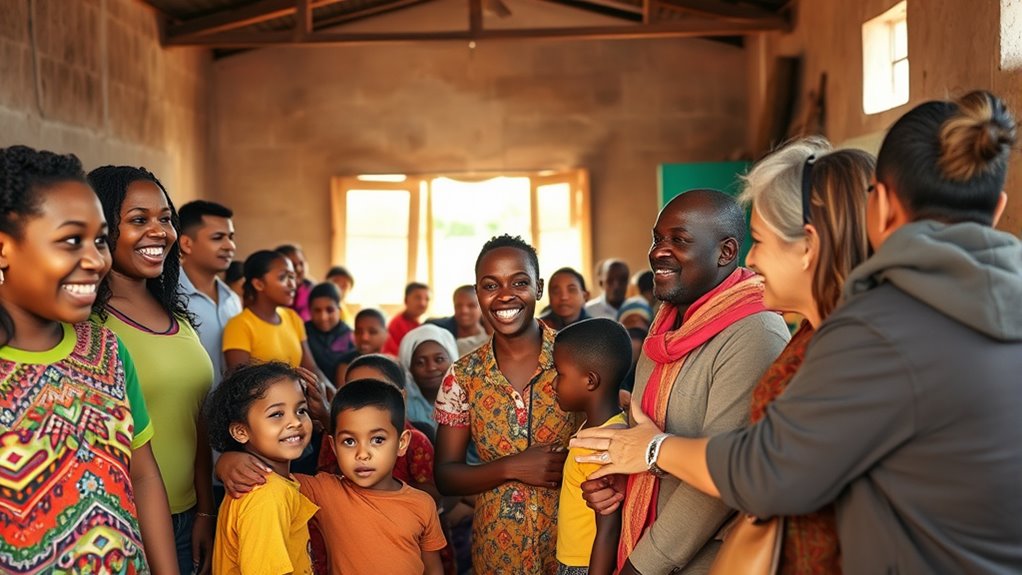
Short-term mission trips often present unexpected challenges that can test your patience, adaptability, and resilience. Language barriers and logistical hurdles may seem intimidating, but they’re manageable with preparation. To overcome these obstacles, keep these principles in mind:
- Embrace patience — misunderstandings happen; staying calm helps resolve them faster.
- Learn basic phrases — even simple words can bridge language gaps.
- Plan ahead — research logistics, transportation, and accommodations thoroughly.
- Stay flexible — unexpected changes are inevitable; adapting keeps you focused on your mission.
Making a Lasting Impact Beyond the Trip
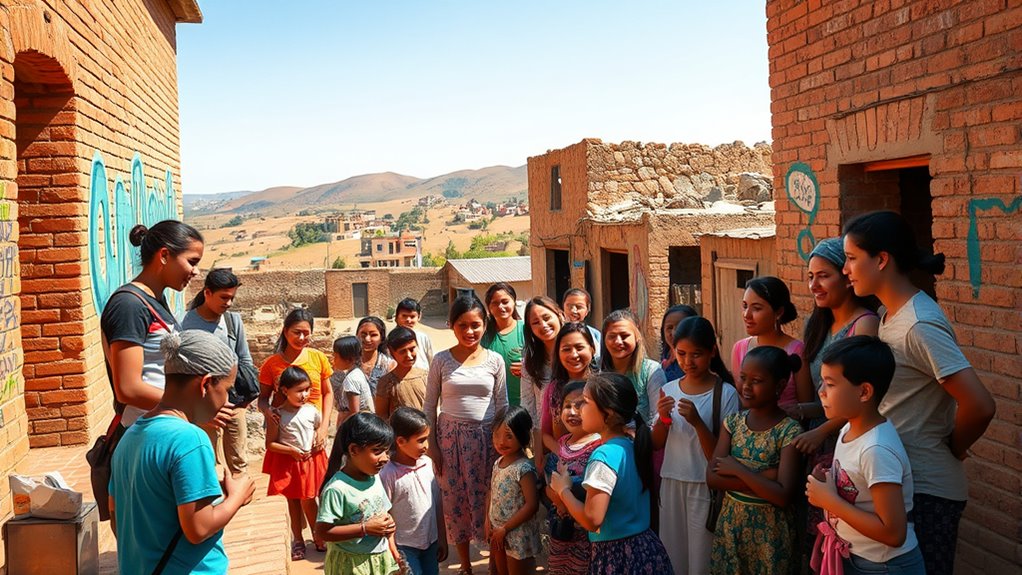
While overcoming immediate challenges during your trip is important, focusing on how your efforts can create a lasting impact is equally essential. To achieve this, prioritize sustainable impact by supporting projects that empower the community long-term. Engage with local leaders to identify their needs and involve them in planning solutions, fostering community empowerment. Avoid short-lived fixes by investing in education, skills training, or infrastructure that communities can maintain independently. Share knowledge and resources to help locals continue progress after you leave. Follow up remotely when possible to gauge ongoing needs and show your genuine commitment. Remember, the goal isn’t just to help temporarily but to enable communities to thrive beyond your visit, creating a meaningful, lasting difference.
Frequently Asked Questions
How Do I Choose the Right Short-Term Mission Trip for Me?
To choose the right short-term mission trip, consider your skills, interests, and spiritual goals. Research programs that emphasize cultural sensitivity to help you respect local customs, and check how they address language barriers to guarantee clear communication. Look for organizations with solid support systems and positive reviews. By doing this, you’ll find a trip that aligns with your passions and prepares you to serve effectively and respectfully in a new environment.
What Safety Precautions Should I Take During My Trip?
Think of your trip as a delicate boat sailing through unfamiliar waters. You should prioritize health precautions like vaccinations and carry a basic first aid kit, acting as your anchor. Practice cultural sensitivity, like respecting local customs, to keep your journey smooth. Always stay aware of your surroundings and follow safety guidelines. These steps protect you and ensure your trip remains a positive, meaningful experience, like a safe voyage across new seas.
How Can I Fund My Mission Trip Effectively?
You can fund your mission trip effectively by exploring various fundraising strategies like hosting events, creating online campaigns, and reaching out to your community. Look for sponsorship opportunities from local businesses, churches, or organizations willing to support your cause. Be proactive in sharing your mission‘s purpose, and always thank your sponsors. Combining these approaches helps you raise the needed funds and builds a network of supporters committed to your journey.
What Do I Pack for a Short-Term Mission Trip?
When packing for a short-term mission trip, focus on clothing essentials and personal toiletries. Bring versatile, modest clothing suitable for various activities and weather, along with comfortable shoes. Don’t forget personal toiletries like soap, toothbrush, and sunscreen. Pack light but complete, including a hat and a reusable water bottle. Prepare for your trip by organizing your essentials, so you’re ready to serve, connect, and make a positive impact from start to finish.
How Do I Stay Connected With My Community Back Home?
To stay connected with your community back home, focus on community engagement through regular updates. Use social media tips like posting photos and stories to share your experiences and progress, keeping friends and family involved. Set a schedule for sharing updates to maintain consistency, and encourage comments for real-time interaction. This way, you remain connected, supported, and engaged with your community throughout your mission trip.
Conclusion
Starting on a short-term mission trip can be transformative, offering growth and meaningful connections. Think of it like planting a seed—your efforts may seem small at first, but with care and consistency, they can grow into lasting change. Just as a single drop creates ripples in a pond, your dedication can inspire others and shape communities long after you return home. Embrace the journey, and let your impact ripple outward.










